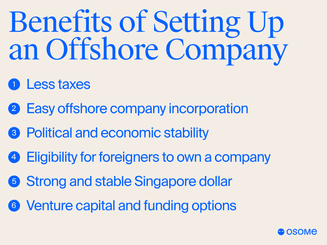Setting Up an Offshore Company in Singapore
- Modified: 18 April 2025
- 13 min read
- Starting a Company


Gabi Bellairs-Lombard
Author
Gabi's passionate about creating content that inspires. Her work history lies in writing compelling website copy and content, and now specialises in product marketing copy. When writing content, Gabi's priority is ensuring that the words impact the readers. As the voice of Osome's products and features, Gabi makes complex business finance and accounting topics easy to understand for small business owners.

Imran Marican
Reviewer
Imran Marican, ATA SCTP member, is our Corporate Tax Assistant Manager based in Singapore, with almost a decade of experience in Singapore corporate tax. With in-depth knowledge of Singapore corporate tax law and regulations, he can help with corporate tax compliance that matters to every company. While our business writers transform complicated tax jargon into easy-to-understand concepts, as a reviewer for the Osome blog, Imran ensures our content is accurate and relevant, helping our readers boost their businesses with helpful tips and insights.
Singapore offshore company setup is simple if you've got the right support along the way. There are benefits for small business owners looking to expand their operations into a tax-efficient, financially stable melting pot of opportunity and innovation.
Here's all you need to know about managing the process of setting up your offshore company in Singapore. When you're ready to start, we're here to help simplify it with our hassle-free incorporation services.
What Is an Offshore Company?
A business registered and run from a region different from its principals and investors or primary business operations is considered an offshore company. Generally, these offshore companies are incorporated outside the country of central operations (which is often outside the country where the company was formed).
It can also refer to a specific offshore jurisdiction or physical territory in a country that affords specific business regulations such as simpler corporate reporting and governance, low or reduced tax schemes and company asset protection. These offshore regions can make foreign company incorporation an attractive and beneficial prospect for entrepreneurs. Now we've covered the definition, let's explore what else you need to know about setting up an offshore company in Singapore.
Looking to register an offshore company in Singapore? Enjoy corporate tax benefits, simplified reporting, and robust asset protection. Let us guide you through a seamless setup process—contact us today to get started!
Why Should I Set Up an Offshore Company in Singapore?
1 Low taxes and tax benefits
One of the main reasons many business owners think about setting up a Singapore offshore company is the flexible tax system and appealing incentives for foreigners. Not only is it flexible, but Singapore's standard corporate tax is also one of the lowest in all of Asia, with a flat rate of 17%.
2 Easy offshore company incorporation process
Another benefit of setting up an offshore company in Singapore is that the incorporation process is simple and straightforward. An outside citizen can complete the incorporation of a new offshore business in Singapore in just days because there's no red tape, and the entire process is focused on efficiency. No wonder this city-state is known as one of the easiest places to do business, and why there are so many offshore entities!
Singapore offshore companies complete their incorporation process digitally, laid out in two important streams of activity (which we explore further down). The first is selecting and approving your new company name; the other involves the more administrative side of submitting the necessary documents. Business registration and offshore incorporation are our specialities, so reach out to our team if you're looking for a Singapore offshore company incorporation, need help with business licenses, or just want to learn more about the process.
3 Political and economic stability
Singapore has been rated as one of Asia's least bureaucratic and most politically stable countries. The government of this Asian city-state has a reputation for being transparent, corruption-free, and pro-business, with a just and reliable legal system. Sound legal parameters reduce the risk of setting up a Singapore offshore company structure which may infringe upon society and the country's integrity. This is made possible through regulations and strict rules of adherence regarding business licenses and operations, IP protection, commerce, HR and asset management.

4 Eligibility for Singapore offshore companies
Singapore offshore company setup requires the services of a corporate secretary, a nominee director, and a registered address. The foreign ownership policies are liberal and open, so business owners considering setting up a company in Singapore will be glad to know there are no restrictions on the permitted fields of business activity. You also won't need prior approval from the authorities in Singapore. Some other key benefits include the fact that 100% foreign shareholding is allowed, and you can also have corporate bodies or individuals as shareholders.
Opening a business bank account is a must when you start an offshore company in Singapore to keep your accounting in order. We have partnered with a few business bank account providers that enable you to open a company and a business account in Singapore within the same day from anywhere in the world. No visits to the bank and no paperwork is required at all.
5 Strong and stable Singapore dollar
For any business owner, the ability to trade is important, making Singapore's strong and stable dollar so attractive. It's one of the strongest currencies in Asia and within the top 15 of the most traded currencies globally. Setting up a Singapore offshore company in Singapore could put you in a good position to tackle future prospects like investments and growth opportunities. There's also been an assuredly low rate of inflation recorded over the decades, which has further instilled confidence in businesses looking to explore a Singapore offshore company as an avenue.
Take advantage of Singapore’s robust economy and stable currency to fuel your business growth. A solid financial environment and low inflation make it an ideal hub for offshore corporations, positioning you for investment opportunities and future expansion.
6 Venture capital and funding options
Private equity funding
The government actively encourages private equity funding in Singapore as it wants private investors to also invest in the various startups in this region. Along with the tax incentive schemes, you can see why Singapore is considered an attractive region for venture capitalists and private equity activities. In this case, you would sell your company's ownership equity to get a cash investment injection.
Angel investors
Capital is not the only thing contributing to this business funding model. Along with financial support, angel investors will often offer their related skill sets to contribute hands-on business expertise. This exchange is also based on a startup handing over a substantial company share to access these ongoing benefits. Not all angel investors are the same, and you can select whether you'd like to go for an investor who is more actively involved or, alternatively, a sleeping partner who's less actively involved. A common trait is that all angel investors seek companies that look, sound, and sell themselves as promising entities.
Private funds
Private funds are more likely to be released or accessible to more established businesses with a track record of high revenue. They could also forecast high growth potential or provide evidence of a good credit track record. Private funds are, therefore, an option better suited to businesses that are not just starting out. Smaller Singapore offshore company startups can seek other options to get loans from institutions like OCBC, DBS, UOB, and the Standard Chartered Bank through the Singapore government.
Venture capital
Venture Capitalists are professional investors with a more direct role in your business. When these investors agree to a stake in your Singapore offshore company, they do so with the vested interests of their own clients. It's worth knowing that the timeframe of partnering with a venture capitalist is generally limited to a timeframe. They are usually only involved for a period of between 2 and 5 years, with a 25% return rate sought to manage the delivery of profits to their clients.
When Should You Consider Setting Up an Offshore Company in Singapore?
Expanding your business
Setting up a Singapore offshore company could be something to consider when your business starts seeing growth, which in turn sees you getting an increase in interest for investment and shareholder buy-in. If these investors you attract prefer to invest through an offshore jurisdiction, it would be worth looking into the benefits of setting up an offshore company in Singapore. This is most often the case with institutional investors looking for viable avenues of investment in business.
Retaining assets to gain income
Not all businesses follow the same model or structure. Perhaps your company is into investment holding. This is often the case in real estate, as the main purpose of retaining assets (like property, for example) is to use them to gain further income or to use them as assets to invest in. There is substantial relief from Stamp Duty and Capital Gains, which is one of the benefits of setting up a Singapore offshore company.
Developing Intellectual Property
If part of your business entails developing Intellectual Property, which you intend to use in different countries, Singapore is ranked second in the world and top in Asia for having the best IP protection in the World Economic Forum's Global Competitiveness Report 2019. Overall, Singapore is recognised as the world's most competitive country, making it a highly attractive prospect for international businesses looking to establish an offshore entity.
How To Set Up an Offshore Company in Singapore
As a foreign investor, you'll have the same rights as residents but will be granted different types of incentives for setting up an offshore company in Singapore.
Here are the key steps involved in offshore company setup:
- Company name: This should follow the legal requirements, which outline that it has to be different from any existing company's name and does not contain offensive or sensitive phrasing or conflict with any Singaporean government agency. This will be public on the government's company registrar.
- Company structure and profile submission: You'll need to decide what type of company structure you will open (sole proprietorship vs private limited liability company, or subsidiary/branch/representative office). Make sure you understand the difference between a branch and a subsidiary office and choose the best option for your future plans.
For offshore companies in Singapore, the private limited structure is usually chosen because of the ease of raising capital, limited liability, credibility as a corporate structure, and tax benefits and incentives available in the country.

What you need to prepare before an offshore company setup
The following are the requirements for setting up an offshore private limited company in Singapore. These ensure your business operations remain legal and aligned with Singapore's regulations.
- At least one shareholder (100% of foreign ownership shareholding is allowed, and the shareholders you choose can be both foreign or local individuals or companies.
- At least one ordinarily resident director who resides in Singapore.
- At least one company secretary appointed within six months of setting up your offshore company who is a permanent resident or Singaporean citizen.
- At the time of your offshore company incorporation, a minimum paid-up capital of $1 is required.
- A registered physical office address in Singapore (a P.O. Box address is not valid; it must be registered as a commercial or residential address).
Focus on building a solid foundation for your offshore company by selecting reliable stakeholders, ensuring compliance with local rules, and securing a strategic office location. A well-prepared setup not only meets regulations but also sets the stage for long-term success in Singapore’s business-friendly environment.
Steps to take after you've set up an offshore company
After you've registered your company, further documents may be required for submission by the registered filing agent. This is all an online process, which you can register and complete digitally on the Singapore government's website, BizFile+. Setting up an offshore company in Singapore requires you to have a digital identity, which is assigned to residents and citizens. This digital identity is called a SingPass and is used to log in to the BizFile+ website.
After the incorporation of your offshore Singapore company is approved, you'll be provided with a Unique Entity Number (UEN), which will serve as your new company's standard identification number.
When setting up your offshore company, you are also required to register with different authorities, such as:
- Registration for Singapore Goods and Services Tax, aka GST or value-added tax
- Registration for the Skills Development Levy, aka SDL (requirement for paying taxes associated with hiring employees)
- Application for required business licences, depending on the nature of your operations
- Opening a corporate bank account
- Registration for the Central Provident Fund (CPF)
Administrative things you have to do annually
- All annual unaudited financial statements should be submitted to the IRAS, together with the tax filing.
- An offshore business incorporated in Singapore must update the details of its company to the Accounting and Corporate Regulatory Authority (ACRA) public register. Names and addresses of all directors, addresses of the principal place of business, and details of all shareholdings should be updated yearly.
- The company must appoint a resident company secretary and a resident director and maintain a legally registered Singapore offshore business address. Professional agencies would offer these services.
The process of deregistering a Singapore-based offshore company will take at least six months, during which you'll need to maintain the resident company secretary and the legally registered office.
What Do Offshore Company Owners Need To Know About Tax?
Foreign-sourced service income
To qualify as tax-exempt for foreign-sourced income remitted to Singapore, three conditions must be met. Below is an illustration of the taxation process using Azure Ltd., a Singapore-incorporated offshore company providing consulting services to clients in Vietnam, India, and the United States.
| Country | DTA with Singapore | Withholding Tax Rate | Income Received (USD) | Tax Withheld (USD) |
| Vietnam | Yes | 15% | $10,000 | $1,500 |
| India | Yes | 10% | $20,000 | $2,000 |
| United States | No | 30% | $30,000 | $9,000 |
| Total | – | – | $60,000 | $12,500 |
Net tax payable to Singapore
Azure Ltd.'s net tax payable is the sum of taxes withheld: $12,500.
This example demonstrates the impact of DTAs and withholding taxes on foreign-sourced service income. Consulting a corporate tax advisor ensures compliance and optimised tax management.
Calculation of foreign tax credit
Foreign Tax Credits (FTCs) help reduce the tax burden by allowing companies to claim a credit for foreign taxes paid. The FTC claimable is the lower of:
- The actual amount of foreign tax paid.
- The amount of Singapore tax attributable to the foreign income.
Income, Foreign Tax Paid, and Singapore Tax Attributable
| Country | Income (USD) | Foreign Tax Paid (USD) | Singapore Tax Attributable (USD) |
| Vietnam | $10,000 | $1,500 | |
| India | $20,000 | $2,000 | |
| United States | $30,000 | $9,000 | |
| Total | $60,000 | $12,500 | $8,159.49 |
FTC Calculation
FTC = $8,159.49 USD (lower of $12,500 and $8,159.49).This example highlights how FTCs are calculated in Singapore. Variations in method and documentation requirements necessitate consultation with a corporate tax advisor to ensure accuracy and compliance.
FAQ
How do offshore companies work in Singapore?
In Singapore, offshore companies are typically incorporated by foreign individuals or businesses to manage overseas operations while benefiting from Singapore’s stable legal system and pro-business environment. These companies must comply with local regulations, but often do not conduct business within Singapore itself.
What is the cost of setting up an offshore company in Singapore?
Setting up an offshore company in Singapore usually starts from around S$1,000 to S$3,000, depending on the services included—such as incorporation, company secretary, and registered address. Annual maintenance fees also apply.
Can I open a Singapore bank account for an offshore company?
Yes, it is possible to open a corporate bank account in Singapore for an offshore company, but local banks require strong documentation, a clear business model, and due diligence checks. A local director or physical presence can improve your chances.
What is the best country to set up an offshore company?
Singapore is often considered one of the best countries in Asia to set up an offshore company due to its strong legal framework, attractive tax regime, and ease of doing business. While not a traditional tax haven, its emphasis on corporate tax efficiency makes it a strategic choice for companies targeting the Asia-Pacific region.
More like this
Get expert tips and business insights
By clicking, you agree to our Terms & Conditions,Privacy and Data Protection Policy
We’re using cookies! What does it mean?






